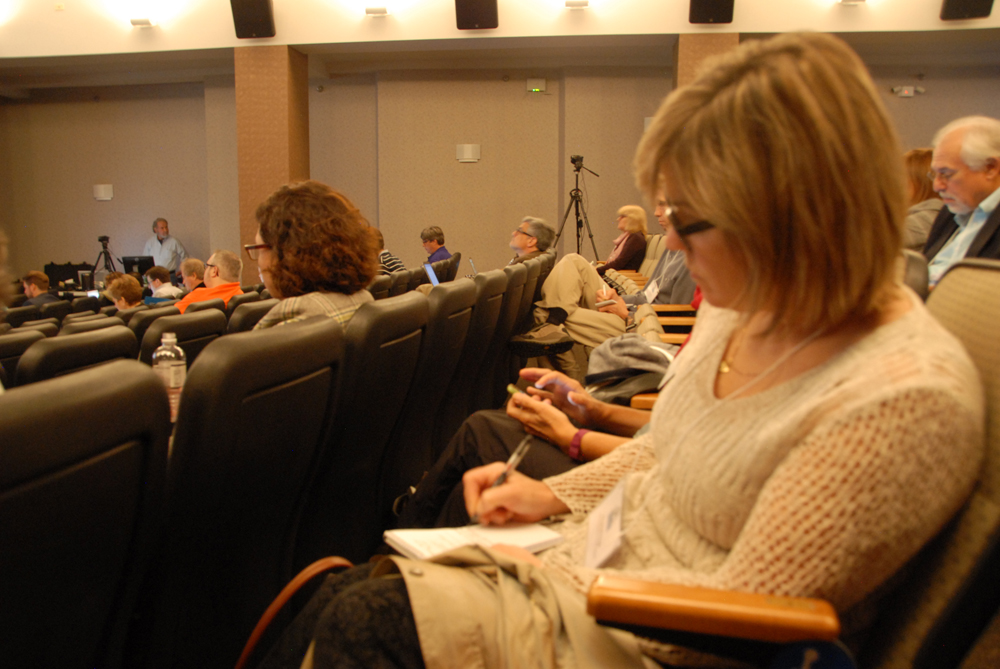How independent local news sites can lead the way in investigative reporting
Tips and tricks from experienced journalists on how to do great investigative reporting and grounded public-service and government reporting in

LION Summit coverage by Sally Duros
Andy Hall of Wisconsin Watch, Steve Beatty from The LensNOLA and Jeff Kelly Lowenstein from Columbia College Chicago shared insight and enthusiasm about their work as investigative journalists and the value of the Investigative Reporters and Editors community.
The three agreed that a great resource at IRE is a database of more than 26,000 projects completed by members and submitted to the investigative awards contest. The archive includes the completed investigative work, the contest entry and the reporters' contact information so those thinking about doing similar work have an example to work from. IRE membership costs $75, or $25 for students.
Some tools and resources discussed included IRE’s database service, where for a sliding scale they will clean up a database include: Document Cloud; The Reporters Committee for Freedom of the Press; Nicar-L – the IRE Listserve; and National Freedom of Information Council.
Jeff Kelly Lowenstein discussed the investigative work he did on a reverse mortgage scam on Chicago’s West Side. The articles were written over time for the Chicago Reporter and updated in other outlets included the Huffington Post. Over time the investigation broadened out to the state level.
Lowenstein said the series was an example of an iteratively published investigative piece, rather than a piece played out over three months – which is the usual approach.
Steve Beatty discussed The Lens “Losing Ground” series done with ProPublica, “The Five Myths of Katrina” with Slate and “Then and Now“ housing in partnership with the Nation.
“ProPublica and the Center for Public Integrity are dying for your stories because they don't have your local sources,” Beatty said.
“We are a nonprofit – we want to “Interestize” (play on monetize) our stories,” Beatty said. “So we crowdsource —- who wants to go out and take some photos for this feature?” And the community complies.
Andy Hall said the work of the Wisconsin Center for Investigative Journalism is guided by its values, which are “Protect the vulnerable. Expose wrongdoing. Seek solutions.”
“We think through how the topic fits into our mission,” Hall said.
It’s important first, to know how things are supposed to work and then understand how they are actually working.
Their series on Wisconsin Governor Scott Walker included stories they had done over time so it included a lot of repurposed work.
When deciding whether to do a story the editors ask, “What good will come out of this? Is there a potential for some broken system to be fixed?”
Perhaps most important the Center considers internal resources – “Are we excited about this? The important thing is the enthusiasm the reporter brings,” Hall said.
The Center works hard to track the impact….a miniature version of what ProPublica does well. (See video “How to track impact of investigative journalism” with the Center’s Lauren Fuhrmann.)
The Center is also experimenting with an art project that illustrates some of the story findings. “The art forces you to think about something that is disquieting,” Hall said.
Sign up for the weekly newsletter
Join the LION mailing list to get our weekly roundup of opportunities and resources for news entrepreneurs. View our most recent issues.
Related Articles
BoiseDev’s winning secret to selling newsletter ads: Only local news, only local ads
The site earns 60 percent of its advertising revenue through its high-open-rate email projects, in partnership with local ad agencies.
AI adoption: How Lede AI helps small publishers quickly generate content readers love
Helping news organizations leverage artificial intelligence with a tool that puts their readers and staff first
Social is down, newsletters are up: How audiences are finding LIONs in 2024
Changes to social media and search prompt publishers to shift strategy.
